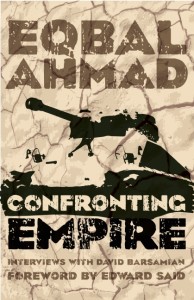
CONFRONTING EMPIRE
Eqbal Ahmad interviewed by David Barsamian, with a Foreword by Edward W. Said
New Introduction by Pervez Hoodbhoy
Haymarket Books (Fall 2016)
Paper • ISBN-13: 9781608466214 • US $16 • 147 pgs.
ABOUT THE BOOK:
Edward W. Said once urged the legendary Eqbal Ahmad (1933–99) not to “leave your words scattered to the winds, or even recorded on tape, but collected and published in several volumes for everyone to read. Then those who don’t have the privilege of knowing you will know what a truly remarkable, gifted man you are.”
Unfortunately, Ahmad died before Said’s words came to fruition. But in this classic book, David Barsamian made Ahmad’s most provocative ideas available in book form. In these intimate and wide-ranging conversations, Ahmad discusses nationalism, ethnic conflict, the politics of memory, and liberation struggles around the world.
PRAISE FOR THE BOOK:
“Ahmad was that rare thing, an intellectual unintimidated by power or authority… Perhaps the shrewdest and most original anti-imperialist of Asia and Africa.”
Edward W. Said
“Fighting words, wise words, from one of the most powerful activist intellectuals of our time.”
Gayatri Chakravorty Spivak
“A dazzling intellectual encounter: thoughtful questions by a superb interviewer, David Barsamian—and brilliant responses by the extraordinary Eqbal Ahmad.”
Howard Zinn
“[Eqbal Ahmad] cared deeply and was willing to believe people could endure and be more brave and creative than they knew. He saw the big picture and still the value of individual stories. His incisive and lucid way of thinking and his voice are clear and sharp in these skillful interviews by David Barsamian.”
Pervez Hoodbhoy, from the Introduction
“For [those] who have missed Eqbal Ahmad in the year since he died, this book comes like rain during a drought.”
Radha Kumar, Council on Foreign Relations
“These interviews provide a wonderfully focused, yet wide-ranging compendium of Eqbal Ahmad’s worldview.”
Richard Falk, Princeton University
PRAISE FOR THE AUTHOR:
“Eqbal Ahmad, perhaps the shrewdest and most original anti-imperialist analyst of Asia and Africa…[was] a man of enormous charisma and incorruptible ideals…. He had an almost instinctive attraction to movements of the oppressed and the persecuted…[and] a formidable knowledge of history. Arabs, for example, learned more from him about the failures of Arab nationalism than from anyone else. … Ahmad was that rare thing, an intellectual unintimidated by power or authority.”
Edward W. Said, author of Culture and Imperialism
“[Eqbal Ahmad] was a shining example of what a true internationalist should be … Eqbal was at home in the history of all the world’s great civilizations. He had an encyclopedic knowledge of states past and present, and he knew that states had a rightful role to play. But he also knew that states existed to serve people not the other way around and he had little to do with governments, except as a thorn in their side. To friends, colleagues, and students, however, he gave unstintingly of himself and his time … His example and his memory will inspire many to carry on his work.”
Kofi Annan, former Secretary-General of the United Nations
“A very dedicated and honorable activist, Eqbal was right in the middle of everything.… He was a student of revolution and imperialism and a very good one.”
Noam Chomsky
“Eqbal Ahmad was unique in combining compassion for the dispossessed-en masse and one by one; the intellectual capacity to analyze cultural, political, and economic issues on a transnational level; and an ability to raise his always eloquent voice on behalf of constructive and original solutions.”
Victor Navasky, Publisher and Editorial Director, The Nation
“Eqbal was a teacher, a poet-analyst, a mentor to far more of us than he knew.”
Phyllis Bennis, Insitute for Policy Studies
“Eqbal Ahmad was a multitude of men—scholar, activist, political analyst, teacher, diplomat, visionary—but, above all, a foot-soldier in the army of peoples everywhere.”
Race and Class
ABOUT THE AUTHORS:
Eqbal Ahmad (1933-1999) was Professor Emeritus of International Relations and Middle Eastern Studies at Hampshire College in Amherst, Massachusetts. He was managing editor of the quarterly Race and Class. His articles and essays appeared in the Nation and other journals throughout the world.
David Barsamian has altered the independent media landscape, both with his weekly radio program, Alternative Radio—now in its thirty-fifth year—and his books with Noam Chomsky, Howard Zinn, Arundhati Roy, and Edward Said.
Edward W. Said (1935-2003) was University Professor of English and Comparative Literature at Columbia. A member of the American Academy of Arts and Sciences, the Royal Society of Literature and of Kings College Cambridge, his celebrated works include Orientalism, The End of the Peace Process, Power, Politics and Culture, and the memoir Out of Place. He is also the editor, with Christopher Hitchens, of Blaming the Victims, published by Verso. He died in September 2003.
RIGHTS INFORMATION:
| Language/Territory | Publisher |
|---|---|
| Turkish worldwide | Zoom |
Please contact subagents for the following languages and territories:
| Language/Territory | Subagent |
|---|---|
| China, Taiwan, Indonesia, Malaysia, and Vietnam | Big Apple Agency |
| Dutch | Sebes & Bisseling Literary Agency |
| English outside North America | David Grossman Literary Agency |
| French | Deborah Druba Agency |
| German | Paul & Peter Fritz AG Literatur Agentur |
| Greek | Read n' Right Agency |
| Hebrew | The Deborah Harris Agency |
| Italian | Berla & Griffini Rights Agency |
| Japanese | The English Agency (Japan) Ltd |
| Korean | BC Agency, or Korea Copyright Center |
| Portuguese | RIFF Agency |
| Russia/Baltics/Eastern Europe | Prava I Prevodi |
| Scandinavia | Sebes & Bisseling Literary Agency |
| Spanish in Latin America | MB Agencia Literaria |
| Spanish in Spain | MB Agencia Literaria |
| Turkish | Anatolialit Agency |
For all other languages/territories, please contact Roam Agency.
